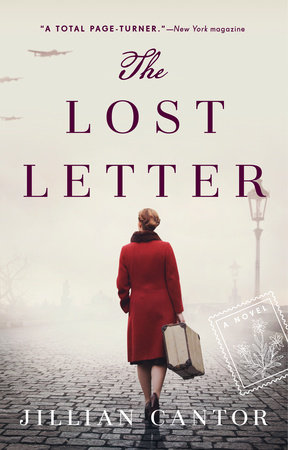***This excerpt is from an advance uncorrected copy proof***
Copyright © 2017 Jillian Cantor
Austria, 1938
At first, Kristoff didn’t understand the power of the burin. He didn’t know that the one small simple-looking engraving tool could eventually save them. Or get them killed. All he knew, in the beginning, was that the burin was impossible to use precisely, and that he was not naturally suited for metal, the way he’d always been for canvas.
He didn’t like the way it felt in his hand either. Oddly heavy, hard to maneuver. He felt it should create lines with the agility of a brush, or even charcoal, and yet his hand kept getting stuck, and he became repeatedly frustrated at his inability to achieve the perfect lines and grooves in the metal the way Frederick showed him. He worried that Frederick would fire him as his apprentice, and then he would have to find not only another job, but also another place to live. As Frederick’s apprentice, Kristoff had been receiving room and board with the Faber family in their beautiful home on the out- skirts of Grotsburg, as well as five schilling a week. But most important, the opportunity to learn the trade that Frederick Faber was known for throughout Austria: engraving. His greatest creation was the country’s most popular—and, Kristoff would argue, artistically perfect—postage stamp, the 12 Groschen Edelweiss. The stamp was a stunning replica of the pure white f lower, and Frederick had both designed and engraved it himself in 1932.
Kristoff remembered placing that stamp on a letter he’d written to his mother once, but had never sent. He could not mail a letter to someone who didn’t exist, or whose existence and location he could never determine in spite of his best efforts. But even as a young boy of thirteen, Kristoff had admired the artistry of that stamp, the perfect bows of the petals. He’d always wanted to make a living as an artist. So when he’d heard the rumor last fall from another street artist in Vienna, that Frederick Faber, the Frederick Faber, was searching for a new apprentice, Kristoff had packed up his art supplies and spent most of his small savings to hire a ride to take him the two hundred kilometers out to Grotsburg. And when he’d arrived, he’d convinced Frederick to give him the job after he showed Frederick some of his charcoal sketches of Vienna.
“You have a good eye,” Frederick had said, staring at what Kristoff thought was his most noteworthy sketch: Stephansdom, elaborate in all its detail of the two wide turrets in the front. Frederick had raised a thick gray eyebrow. “But what do you know of metal, my boy?”
“I’m a quick learner,” Kristoff had promised, and that had seemed enough to convince Frederick to take him on. Though, so far, this had turned out not to be true, at least where engraving was concerned.
Though he didn’t master the burin right away, Kristoff did learn two things in his first few weeks working for Frederick. One, Frederick was older than Kristoff had initially thought, and sometimes his hands began to shake when he tried to teach Kristoff how to use the engraving tools. Frederick had told Kristoff he needed an apprentice because there was business enough for two master engravers to work on his stamp assignments for Austria, but now Kristoff suspected the real reason was that Frederick might not be able to continue on with his trade much longer. And Frederick didn’t have any sons.
That was the second thing Kristoff learned. Frederick had two daughters: Elena, who was seventeen, a year younger than Kristoff, and who reminded Kristoff of the edelweiss with her snowy skin, waves of long light brown hair, and bright green eyes. And Miriam, who was thirteen. If Elena was a flower, then Miriam was the buzzing bee who wouldn’t leave the flower alone. Or, as Mrs. Faber called her with an exasperated roll of her green eyes, a flibbertigibbet. But Kristoff still found her amusing, even when her family did not.
Kristoff quickly became accustomed to life in Grotsburg, where the world was green and very quiet, and instead of buildings and throngs of people, he woke up each morning to a view of the forest and rolling hills. But even more, Kristoff reveled in the warmth of the Fabers’ dining room, of the fragrant smell of Mrs. Faber’s stews, of the bread they broke on Friday nights in the glow of their candles. The challah was a savory bread, and Kristoff had never tasted anything like it growing up in the orphanage in Vienna, where the nuns had led him to believe there was only one religion anyway. Not that he was necessarily a believer. Kristoff was much more drawn to the Fabers, the light and wholeness of their family, than he had ever been to God or the institutional church.
“Miriam, sit still,” Mrs. Faber chastised, one night a few weeks after Kristoff had begun his apprenticeship. Almost a month in, Kristoff was still failing miserably at the metalwork. Though earlier that day he had impressed Frederick with his sketch of the hillside, and even hours later, he was still basking in Frederick’s compliment that it was “not half bad.”
“I’m sitting still, Mother,” Miriam said in a singsong voice, bouncing slightly in her chair and casting a sideways smile at Kristoff.
Kristoff hid his own smile in his spoonful of soup. He glanced at Elena, but she refused to look at him. He had yet to determine whether she was shy or rude, whether she acted so standoffish around everyone, or whether it was just around him.
“Elena, dear. Go fetch another log or two for the fire. It’s chilly in here,” Mrs. Faber said. It was the deepest, coldest part of winter, and the Faber’s three-story wooden house was drafty. Kristoff ’s room in the attic had a small woodstove, but he had to huddle under two blankets to stay warm at night. Still, it far surpassed the orphanage, his bed in a row of ten others in a large cold room, and only a thin blanket to cover him. And Mrs. Faber’s cooking was much better than the nuns’.
Elena put her soup spoon down and stood. Kristoff tried to meet her eyes again, but she wouldn’t look up.
“I can help.” Kristoff stood, before he lost his nerve, and Elena turned toward him. At least he’d caught her attention.
Her beautiful face sunk into a frown. “It’s not—” she began.
Mrs. Faber spoke over her: “Thank you, Kristoff. I’m sure Elena would appreciate that.”
He smiled at Mrs. Faber and followed Elena. They went wordlessly through the kitchen, out the back door, toward the woodpile, which rested across the Fabers’ sprawling yard in front of Frederick’s workshop. The earth was frozen, and the ground crunched beneath their feet; the night air was biting and neither Kristoff nor Elena had grabbed a coat. Elena shivered, and her hair fell into her eyes as she reached down to grab the wood. Kristoff resisted the urge to pull it back, and instead reached down and took the log from her hands.
“Really,” she said sharply, pulling it back and holding it toward her chest. “I’m just fine. I’ve been doing this on my own long before you came here. I don’t need your help.”
“But I want to help,” he said. “And it’s no trouble.” Elena glared, and he was suddenly certain that she was not shy—she just didn’t like him. And this realization bothered him. He had the urge to fix it.
But before he could say more, Elena turned and began to walk back toward the house. Kristoff picked up another log from the pile and ran after her. He caught her just before they reached the back door, and he reached for her shoulder. “Have I done something?” he asked her, slightly out of breath from running in the cold. His words came out jagged and smoky against the chilly air.
“Something?” she echoed back.
“To upset you?”
“Why should you think that?” Her breath made frosty rings in the air, and she shivered again.
“Never mind,” he said. “We should get back inside. You’re freezing.”
“Look,” she said. “It’s just that we’re not friends, okay. We’re not going to be friends. I don’t expect you to be here long. They never are.”
“They?” he asked, considering, for the first time, Frederick’s last apprentice, or maybe his last few? Were they all terrible with the burin, like him, and promptly fired?
But Elena didn’t answer. She carried the wood inside and placed it into the fire. Kristoff did the same, and then he excused himself to go to bed. Up in the attic, wrapped in two blankets, he took out his sketch pad and a nib of charcoal. He found himself sketching Elena’s angry green eyes and wondering how long this place would stay his home.
. All rights reserved. No part of this excerpt may be reproduced or reprinted without permission in writing from the publisher.







